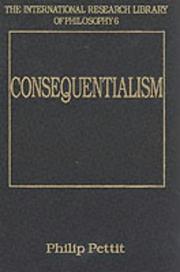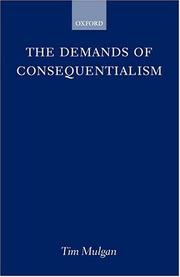| Listing 1 - 10 of 65 | << page >> |
Sort by
|

ISBN: 0199286973 9780199286973 Year: 2008 Publisher: Oxford: Clarendon,
Abstract | Keywords | Export | Availability | Bookmark
 Loading...
Loading...Choose an application
- Reference Manager
- EndNote
- RefWorks (Direct export to RefWorks)
According to consequentialism, we should always put our resources where they will do the most good. A small contribution to a reputable aid agency can save a child from a crippling illness. We should thus devote all our energies to charity work, as well as all our money, till we reach the point where our own basic needs, or ability to keep earning money, are in jeopardy. Such conclusions strike many people as absurd. Consequentialism seems unreasonably demanding, as it leaves the agent no room for her own projects or interests. Tim Mulgan examines consequentialist responses to this objection. A variety of previous consequentialist solutions are considered and found wanting, including rule consequentialism, the extremism of Shelly Kagan and Peter Singer, Michael Slote's satisficing consequentialism, and Samuel Scheffler's hybrid moral theory. The Demands of Consequentialism develops a new consequentialist theory, designed to be intuitively appealing, theoretically sound, and only moderately demanding. Moral choices are first divided into distinct realms, primarily on the basis of their impact on the well-being of others. Each realm has its own characteristic features, and different moral realms are governed by different moral principles. The resulting theory incorporates elements of act consequentialism, rule consequentialism, and Scheffler's hybid theory. This original and highly readable account of the limits of consequentialism will be useful to anyone interested in understanding morality.
Book
ISBN: 0198246579 Year: 1982 Publisher: Oxford Clarendon
Abstract | Keywords | Export | Availability | Bookmark
 Loading...
Loading...Choose an application
- Reference Manager
- EndNote
- RefWorks (Direct export to RefWorks)
Book
ISBN: 9780190905354 0190905352 9780190905347 0190905344 9780190905330 0190905336 Year: 2020 Publisher: New York, NY Oxford University Press
Abstract | Keywords | Export | Availability | Bookmark
 Loading...
Loading...Choose an application
- Reference Manager
- EndNote
- RefWorks (Direct export to RefWorks)
This handbook contains thirty-two previously unpublished contributions to consequentialist ethics by leading scholars, covering what’s happening in the field today as well as pointing to new directions for future research. Consequentialism is a rival to such moral theories as deontology, contractualism, and virtue ethics. But it’s more than just one rival among many, for every plausible moral theory must concede that the goodness of an act’s consequences is something that matters even if it’s not the only thing that matters. Thus, all plausible moral theories will accept both that the fact that an act would produce good consequences constitutes a moral reason to perform it and that the better that act’s consequences the greater the moral reason there is to perform it. Now, if this is correct, then much of the research concerning consequentialist ethics is important for ethics in general. For instance, one thing that consequentialist researchers have investigated is what sorts of consequences matter: the consequences that some act would have or the consequences that it could have—if, say, the agent were to follow up by performing some subsequent act. And it’s reasonable to suppose that the answer to such questions will be relevant for normative ethics regardless of whether the goodness of consequences is the only thing that matters (as consequentialists presume) or just one of many things that matter (as nonconsequentialists presume).

ISBN: 1855213044 Year: 1993 Publisher: Aldershot Dartmouth
Abstract | Keywords | Export | Availability | Bookmark
 Loading...
Loading...Choose an application
- Reference Manager
- EndNote
- RefWorks (Direct export to RefWorks)

ISBN: 0312160992 Year: 1997 Publisher: New York St. Martin's Press
Abstract | Keywords | Export | Availability | Bookmark
 Loading...
Loading...Choose an application
- Reference Manager
- EndNote
- RefWorks (Direct export to RefWorks)
Bioethics. --- Consequentialism (Ethics) --- Medical ethics. --- Consequentialism (Ethics).

ISBN: 0198250932 Year: 2001 Publisher: Oxford : Clarendon press,
Abstract | Keywords | Export | Availability | Bookmark
 Loading...
Loading...Choose an application
- Reference Manager
- EndNote
- RefWorks (Direct export to RefWorks)
Consequentialism (Ethics) --- Ethics --- Philosophy --- Utilitarianism --- Consequentialism (Ethics).
Book
ISBN: 2130632610 9782130632610 Year: 2014 Publisher: Paris: PUF,
Abstract | Keywords | Export | Availability | Bookmark
 Loading...
Loading...Choose an application
- Reference Manager
- EndNote
- RefWorks (Direct export to RefWorks)
[2014] L'éthique doit-elle accorder la priorité à l'évaluation des conséquences de nos actes ? L'éthique doit-elle se détourner des conséquences de nos actes et accorder la priorité à des règles que nous devrions suivre absolument ? L'éthique ne doit-elle pas bien plutôt s'attacher à la construction et au perfectionnement de nous-mêmes comme agents moraux vertueux ? Cet ouvrage a pour but d'introduire le lecteur dans les argumentations philosophiques défendant chacune des trois méthodes permettant de penser l'éthique : le conséquentialisme, la déontologie et l'éthique des vertus. Il entend donner les clés des nombreux débats actuels sur les questions d'éthique en fournissant les données fondamentales de la discipline et en expliquant les apports de la philosophie contemporaine en la matière.
Book
ISBN: 9780190905323 Year: 2020 Publisher: New York, N.Y. Oxford University Press
Abstract | Keywords | Export | Availability | Bookmark
 Loading...
Loading...Choose an application
- Reference Manager
- EndNote
- RefWorks (Direct export to RefWorks)
"This handbook contains thirty-two previously unpublished contributions to consequentialist ethics by leading scholars, covering what's happening in the field today as well as pointing to new directions for future research. Consequentialism is a rival to such moral theories as deontology, contractualism, and virtue ethics. But it's more than just one rival among many, for every plausible moral theory must concede that the goodness of an act's consequences is something that matters even if it's not the only thing that matters. Thus, all plausible moral theories will accept both that the fact that an act would produce good consequences constitutes a moral reason to perform it and that the better that act's consequences the moral reason there is to perform it. Now, if this is correct, then much of the research concerning consequentialist ethics is important for ethics in general. For instance, one thing that consequentialist researchers have investigated is what sorts of consequences matter: the consequences that some act would have or the consequences that it could have-if, say, the agent were to follow up by performing some subsequent act. And it's reasonable to suppose that the answer to such questions will be relevant for normative ethics regardless of whether the goodness of consequences is the only thing matters (as consequentialists presume) or just one of many things that matter (as non-consequentialists presume)"--
Book
ISBN: 2130820530 Year: 2014 Publisher: Paris : Presses Universitaires de France,
Abstract | Keywords | Export | Availability | Bookmark
 Loading...
Loading...Choose an application
- Reference Manager
- EndNote
- RefWorks (Direct export to RefWorks)
L'éthique doit-elle accorder la priorité à l'évaluation des conséquences de nos actes ? Ne doit-elle pas, au contraire, se détourner des conséquences de nos actes et accorder la priorité à des règles que nous devrions suivre absolument ? Ou bien est-elle finalement un instrument nécessaire à la construction et au perfectionnement de nous-mêmes comme agents moraux vertueux ? Cet ouvrage a pour but d'introduire le lecteur dans les argumentations philosophiques défendant chacune des trois méthodes permettant de penser l'éthique : le conséquentialisme, la déontologie et l'éthique des vertus. Il entend donner les clés des nombreux débats actuels sur les questions d'éthique en fournissant les données fondamentales de la discipline et en expliquant les apports de la philosophie contemporaine en la matière.
Book
ISBN: 3897859424 Year: 2012 Publisher: Paderborn : Mentis,
Abstract | Keywords | Export | Availability | Bookmark
 Loading...
Loading...Choose an application
- Reference Manager
- EndNote
- RefWorks (Direct export to RefWorks)
Die These der philosophischen Skepsis besagt, dass Menschen über keinerlei Wissen bzw. Rechtfertigung verfügen. So unplausibel diese These klingen mag, so überraschend ist es, dass sie gleich durch eine Vielzahl an Argumenten verteidigt werden kann. Die besten dieser Argumente lassen sich in gewisser Hinsicht als Paradoxa verstehen: Aus äußerst plausiblen Prämissen werden in logisch einwandfreier Weise Konklusionen abgeleitet, die sehr unplausibel – ja, geradezu absurd sind. Befriedigende Lösungen skeptischer Paradoxa sind daher unerlässlich, um ein kohärentes Verständnis von Wissen und Rechtfertigung zu erarbeiten. In diesem Buch werden zunächst die gesamte Bandbreite skeptischer Argumente sowie wichtige anti-skeptische Lösungsansätze systematisch analysiert. Ausgehend von dieser Analyse wird dann ein bisher übersehener, einheitlicher Lösungsweg hinsichtlich aller skeptischen Paradoxa motiviert und auf seine Tragfähigkeit hin geprüft. Die anvisierte Lösung führt über eine Auseinandersetzung mit der Struktur kognitiver Projekte schließlich zur Theorie des 'nicht-wahrheitsindikativen Konsequentialismus'. Obwohl diese Theorie bisher kaum Beachtung fand, fällt ihr theoretisches Kosten-Nutzen-Verhältnis insbesondere im Vergleich mit vielbeachteten alternativen Lösungsansätzen überraschend positiv aus.
| Listing 1 - 10 of 65 | << page >> |
Sort by
|

 Search
Search Feedback
Feedback About UniCat
About UniCat  Help
Help News
News